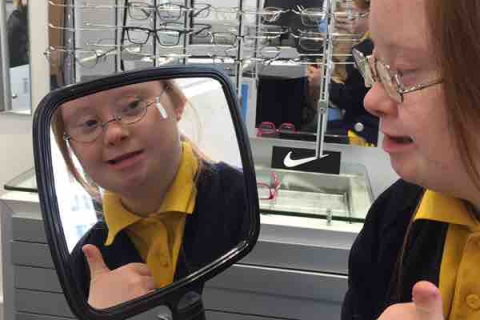

The University's Eye Clinic has begun offering specialised treatment to people with Down Syndrome
The University of Portsmouth’s Eye Clinic has begun offering specialised treatment to people with Down Syndrome, sparing many from having to travel to the only other centre offering specialist help in Wales.
The Portsmouth Eye Clinic has a history of offering eye care to those who don’t easily fit into the high street optician model of 20-minute appointments. People with Down Syndrome sometimes need specialist glasses frames and can benefit from extended appointment times in a quiet non-pressurised environment.
Those with Down Syndrome can and do go to high street opticians, but the eye clinic wanted to go further and dedicate more time, specialist equipment and resources to make it simpler for anyone with complex problems.
The clinic team were inspired by Dr Margaret Woodhouse’s specialist optical clinic in Cardiff which treats children with Down Syndrome from across the UK and has a two-year waiting list.
Eye Clinic Manager Daniel Stride said: “We are passionate about working day in, day out with our community to bring services not otherwise available, and I’m proud of our team’s ability and facilities which enable us to help those who face barriers to getting eye care.
“We want to work alongside high street opticians to ensure we offer a complementary service to those who might otherwise fall through the cracks.
“One of the benefits of our clinic is we are able to dedicate as much clinical time as necessary to our patients and we have seen some patients on numerous occasions. It’s humbling to see a scared or distracted child come in and for our staff to have the time and skills to take as long as it takes to get them tested and, if necessary, fitted with glasses that can offer such benefit to their daily lives.”
Rosie Johnson, aged 14, and her mum Mary recently visited the clinic to get Rosie's eyes tested as her sight needs to be checked every year and they had already missed an appointment in 2020 because of the pandemic.
Mary said: "As a mum, you worry. Poor Rosie has already been through a lot, but they were brilliant. Staff at the clinic took time to get to know Rosie on the phone before I took her in to get to know her and to understand any anxiety or other issues. They make the whole experience just wonderful.
“The optometrist, Anthea, took ages helping Rosie relax and enjoy being in the clinic. She was absolutely fantastic, so laid back and child-friendly. In the end, Rosie was prescribed bifocals. Now she’s 14, it matters to her that she doesn’t stand out and she can’t wait for her new glasses."
The clinic is staffed by skilled optometrists who divide their time between the clinic and other community roles. It is equipped to offer standard eye tests for everyone, but also to work with people with complex needs, such as children with learning difficulties, autism or cerebral palsy and adults with brain tumours, who all require more time and highly specialised equipment and skills.
Mr Stride gave dispensing optician Ian Rampton free rein in finding new ways to reach those sometimes disadvantaged by mainstream eye treatment.
Mr Rampton wrote to charities in the region offering specialist eye care and the Portsmouth Down Syndrome Association “leapt at the offer” and worked with the eye clinic, in offering training and advice.
In its first week, the clinic saw four children with Down Syndrome and quickly started receiving word-of-mouth referrals from further afield.
Mr Rampton said: “I don’t think any of us appreciated just how big the unmet need was. We’ve seen four children with Down Syndrome this week. We are aiming to give them appointments tailored to their needs. We find out what frightens them and what makes them happy and we work around that.
“If we can take a child out of the shadows and make them part of a wider society by trying to improve their vision, then every effort we can make is worth it.”
The clinic is equipped with non-verbal tests, some using pictures instead of letters, for those who can’t read, and stocks brands of spectacle frames designed for different facial features.
